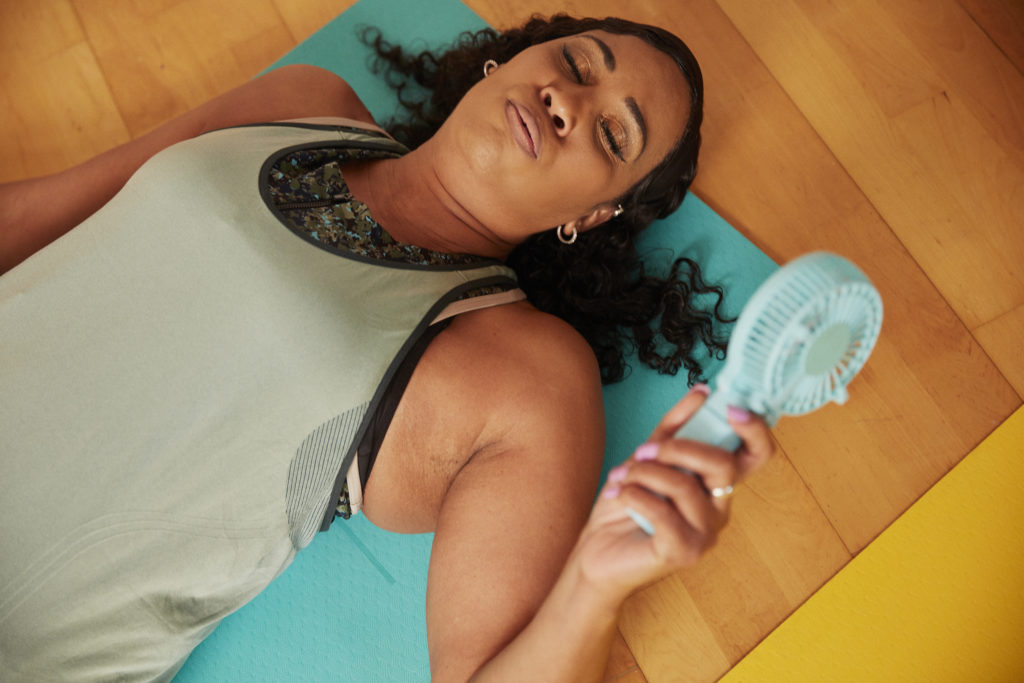
We have enlisted the help of two experts in menopause fitness and wellbeing. Julie Robinson, founder of MenoHealth and Helen Tite, founder of iCareiMove to provide menopause tips on taking back control during the menopause.
Menopause is a natural part of aging that affects 50% of the population, but it can still be a taboo subject or one that is greatly misunderstood. Symptoms of menopause and perimenopause range from hot flushes, headaches, night sweats, reduced sex drive, memory, and concentration lapses, low mood, vaginal dryness, and a change in the normal pattern of your periods.
We have curated our top tips, provided by experts Julie and Helen, to help you find a natural way to manage symptoms during the menopause:
Moving medicine – the ‘fab four’
“Exercise is menopause medicine and should be taken daily!” According to Julie. “Aim to include these ‘fab four’ exercises into your routines to get the best benefits for your overall health and fitness: flexibility, aerobics, balance, and strength. Take it gently at first and build up gradually to avoid achy joints.”
There’s strength in numbers
At classfinder we love group exercise because it not only allows you to get active but it creates a social community that you can connect with in person (or online). Our expert Helen believes “women supporting women is a powerful thing. Facing the transition into menopause can be simple or complex and sharing your experiences with similar Goddesses (let’s face it we are all Goddesses!) can help us with our mental wellness. With over 70 symptoms of menopause, we have plenty to talk about, and talking is good. Get it off your chest!”
Add weight…
From the age of 50, we lose up to 2% of our muscle mass each year. This can be managed by concentrating on resistance exercises where you lift, push, or pull against a load. Julie explains that “You don’t have to be a gym bunny, using your own body weight, bands or even tins of beans will work. And as muscles burn more calories than fat, this can help you combat menopause muffin top too.” Win, win!
Move to your own (heart)beat
Helen reminds us that our “heart is also a muscle and just like the rest of your awesome magnificent changing body, you must keep that heart muscle trained. The menopause may be the start of niggles, so some prefer walking to jogging and that’s ok. Whatever you do to get out of breath, do it and plenty of it. Move more and sit less.”
Julie recommends aerobic exercises that “increase your heart and breathing rate and have been shown to help with menopausal brain fog and reduce the severity of hot flushes. So turn up the music and get dancing!”
Mood changes:
“Many women experience low mood, anxiety, and loss of confidence during perimenopause. Finding an activity you love and losing yourself in the moment promotes the release of happy hormones in your brain and can really lift your mood” advises Julie.
Menopause is likely to set in around the same time as some other major life changes. Your children may be leaving home, you could have caring duties for older parents, and you may be experiencing changes in your career, finances, and health. Helen calls this ‘our life laundry.’ “Meditation is one way to take some time out just for yourself or “yoga and Pilates or even Pilability and MenoClasses with mindfulness already built-in. This is proven to reduce stress hormones and fire off happy hormones. Start with simple breathing techniques and grow from there.”
Your bones matter
Oestrogen plays an important part in our bone health. As we age, and once menopause starts, there is a drop in the amount of Oestrogen we have in our bodies. Julie recommends “boosting your bone health by including some impact in your routines. Hopping, skipping and jumping actions (which work best when done to some great music), can help prevent osteoporosis.”
Helen suggests that using weights or your own body weight is a great way to keep your bones healthy. “If I was Queen for the day, I would insist that everyone picks up weights and train with them at every age.”
Get a second opinion
Many of us turn to ‘Dr. Google’ when we are concerned about our health but Helen warns us to be cautious of advice given by “non-qualified “so-called” experts and influencers out there. Stick with those who are experts in the field of menopause and ageing wellness. Sometimes it is easy to dismiss symptoms, such as stress, but during midlife, it is often connected to menopause. Why not keep a journal to get a more accurate overview of what you are experiencing and possibly talk to your GP about a diagnosis? You know your body. Learn about your changing health and embrace the change.”
What should anyone going through the menopause remember?
Helen advises us to “remember who you are. Menopause can be an amazing time in your life. Don’t fear it, just own it, rock it, and stretch it!“
Julie explains that “menopause is a golden opportunity to get active and stay active. What you do during this time can hugely impact your future health and wellbeing – so get moving!”
If you would like more information you can visit MenoHealth and iCareiMove.

